Recall API ช่วยให้เกมจัดการลิงก์ระหว่างผู้ใช้บริการเกมของ Google Play (PGS) กับ บัญชีในเกมได้โดยจัดเก็บโทเค็นเรียกคืนข้อมูลไว้กับเซิร์ฟเวอร์ของ Google ต่อไปนี้คือ สถานการณ์ตัวอย่างของวิธีใช้ Recall API
ผู้ใช้กำลังเล่นเกมที่นักพัฒนาแอปมีระบบระบุตัวตนเพื่อติดตามความคืบหน้าของผู้ใช้ และใช้ PGS ควบคู่ไปกับวิธีการตรวจสอบสิทธิ์อื่นๆ เพื่อบันทึกผู้ใช้เข้าสู่เกม ในตัวอย่างนี้ ผู้ใช้เข้าสู่ระบบบัญชี PGS ชื่อ Laura และสร้างบัญชีในเกมด้วยระบบข้อมูลประจำตัวของนักพัฒนาแอปชื่อ Racer94 ขณะที่ผู้ใช้เล่นเกม เซิร์ฟเวอร์เกมของนักพัฒนาแอปจะซิงค์ความคืบหน้าของผู้ใช้
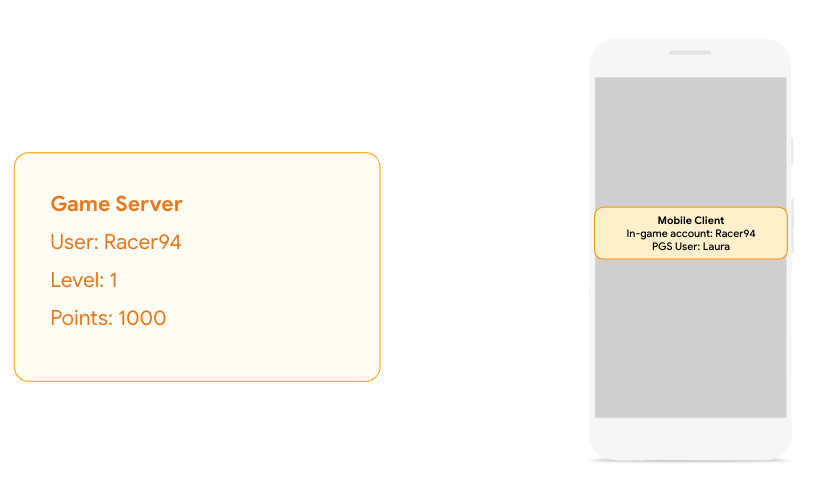
นอกจากนี้ นักพัฒนาแอปยังบันทึกโทเค็นเรียกคืนข้อมูลไว้กับ Google ซึ่ง สอดคล้องกับบัญชีในเกมของผู้ใช้ Google จะจัดเก็บโทเค็นเรียกคืนข้อมูลดังกล่าวกับโปรไฟล์ PGS ของผู้ใช้โดยอัตโนมัติ

ตอนนี้ผู้ใช้ตัดสินใจที่จะเล่นเกมใน GPG บน PC เป็นครั้งแรก ระบบจะตรวจสอบสิทธิ์ผู้ใช้โดยอัตโนมัติ ด้วยบัญชี PGS และไคลเอ็นต์เกมจะตรวจสอบว่า มีความคืบหน้าใดๆ สำหรับผู้ใช้ PGS นี้หรือไม่ จากนั้นเซิร์ฟเวอร์เกมจะ ส่งคำค้นหาไปยัง Google เพื่อดูว่ามีโทเค็นสำหรับบัญชี PGS นี้หรือไม่ เนื่องจากมี Google จึงส่งโทเค็นเรียกคืนข้อมูลกลับมา และเซิร์ฟเวอร์เกมจะใช้โทเค็นนั้นเพื่อค้นหาบัญชี Racer94 ที่เชื่อมโยงของผู้ใช้ และกู้คืนความคืบหน้าของผู้ใช้ เนื่องจากการตรวจสอบสิทธิ์ด้วย PGS เป็นประสบการณ์ที่ราบรื่น แอปจึงกู้คืนความคืบหน้าของผู้ใช้โดยที่ผู้ใช้ไม่ต้องป้อนชื่อผู้ใช้หรือรหัสผ่าน นอกจากนี้ นักพัฒนาแอปยังใช้การตรวจสอบสิทธิ์ PGS กับระบบข้อมูลประจำตัวที่มีอยู่ และใช้ Google เพื่อจัดเก็บลิงก์ระหว่างความคืบหน้าของผู้เล่นกับบัญชี PGS ได้ด้วย

ดังที่เห็นในตัวอย่างก่อนหน้านี้ มีการดำเนินการหลัก 2 อย่างที่ Recall API ดำเนินการ ดังนี้
จัดเก็บโทเค็นกับ Google เมื่อผู้ใช้เข้าสู่ระบบด้วยบัญชีในเกม
ดึงโทเค็นสำหรับผู้ใช้เพื่อกู้คืนบัญชีในเกม
นอกจากโทเค็นเรียกคืนข้อมูลแล้ว Recall API ยังต้องใช้ตัวระบุที่เสถียร ซึ่งสอดคล้องกับบัญชีในเกมด้วย ซึ่งเรียกว่าลักษณะตัวตน คุณอาจคิดว่า เพอร์โซนาคือป้ายกำกับที่แสดงถึงบัญชีในเกมของผู้ใช้ภายใน ระบบข้อมูลประจำตัวของนักพัฒนาแอป และโทเค็นการเรียกคืนคือคีย์ที่ใช้ กู้คืนบัญชีในเกมของผู้ใช้ไปยังเกม ห้ามนำค่าลักษณะตัวตนและโทเค็นมาใช้ซ้ำในโปรเจ็กต์ PGS ที่แตกต่างกัน นอกจากนี้ แม้ว่าโทเค็น Recall อาจมีการเปลี่ยนแปลงเมื่อเวลาผ่านไป แต่ตัวตนควรจะคงที่ตามบัญชีในเกมของผู้ใช้
ขั้นตอนทางเทคนิคสำหรับการจัดเก็บและเรียกโทเค็น Recall
ส่วนนี้ครอบคลุมขั้นตอนทางเทคนิคระหว่างไคลเอ็นต์เกมและเซิร์ฟเวอร์กับเซิร์ฟเวอร์ของ Google เมื่อจัดเก็บและเรียกโทเค็นเรียกคืนข้อมูล
ขั้นตอนที่ 1: ตรวจสอบสิทธิ์ผู้ใช้ PGS และดึงข้อมูลรหัสเซสชัน
เกมจะเริ่มต้น PGS SDK และพยายามตรวจสอบสิทธิ์ผู้ใช้ด้วย PGS

หากผู้ใช้ได้รับการตรวจสอบสิทธิ์แล้ว ให้ขอรหัสเซสชันจาก Games SDK ในไคลเอ็นต์เกม และขอโทเค็น OAuth 2.0 จากแบ็กเอนด์ OAuth ของ Google ระบบจะใช้รหัสเซสชันและโทเค็น OAuth 2.0 ในการสื่อสารกับแบ็กเอนด์ของ Google Games
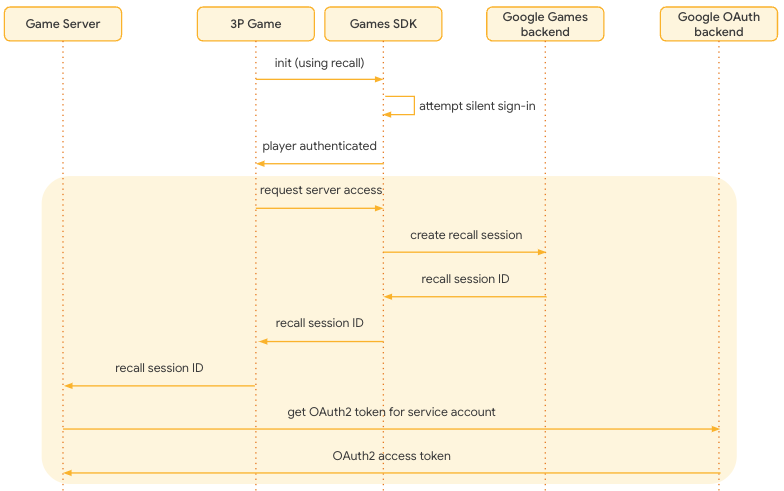
ขั้นตอนที่ 2: เรียกโทเค็นการเรียกคืนที่มีอยู่
ขอโทเค็นเรียกคืนข้อมูลที่เชื่อมโยงกับบัญชีของผู้ใช้ PGS หากมีโทเค็น ให้ไปที่ขั้นตอนที่ 3ก และกู้คืนความคืบหน้า ไม่เช่นนั้น หากเป็นผู้ใช้ใหม่และไม่มีโทเค็น ให้ไปที่ ขั้นตอนที่ 3b และจัดเก็บโทเค็นใหม่
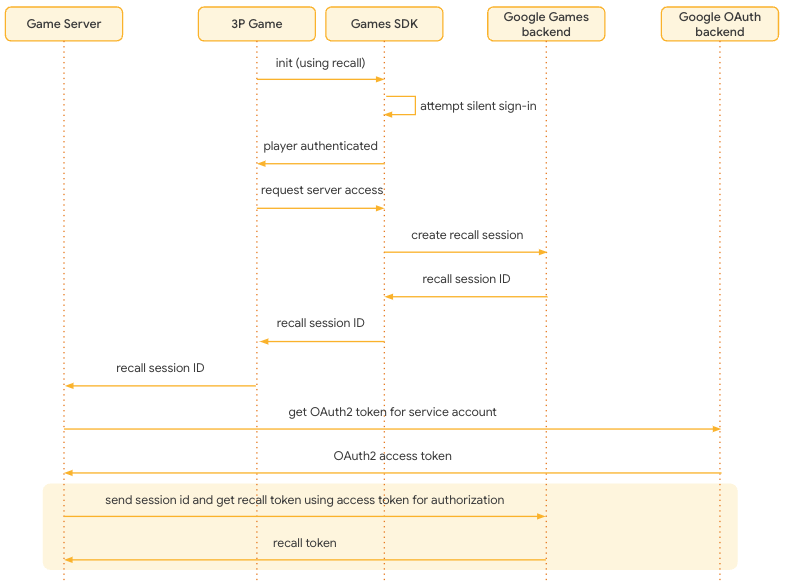
ขั้นตอนที่ 3ก: หากมีโทเค็น ให้กู้คืนความคืบหน้า
หากมีโทเค็น ให้เรียกข้อมูลและถอดรหัสโทเค็น แล้วกู้คืนข้อมูลผู้ใช้
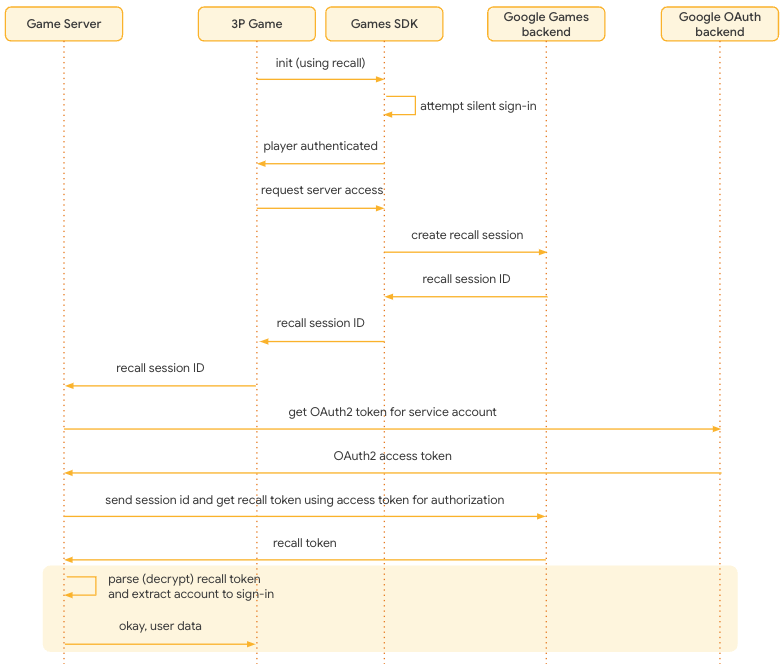
ขั้นตอนที่ 3b: หากไม่มีโทเค็น ให้จัดเก็บโทเค็น
เนื่องจากไม่มีโทเค็น ระบบจึงไม่คืนค่าความคืบหน้า ผู้ใช้จะไปยังการตรวจสอบสิทธิ์แพลตฟอร์ม ด้วยระบบข้อมูลประจำตัวของนักพัฒนาแอป หรือสร้างบัญชีใหม่หากไม่มี โปรดทราบว่านี่ไม่ใช่การตรวจสอบสิทธิ์ใน PGS (ซึ่งได้ดำเนินการไปแล้ว) แต่เป็นการตรวจสอบสิทธิ์ด้วยระบบข้อมูลประจำตัวของนักพัฒนาแอปภายนอก PGS

สร้างโทเค็นเรียกคืนข้อมูลที่เข้ารหัสซึ่งเข้ารหัสบัญชีในเกมของผู้ใช้ แล้ว ส่งไปยัง Google พร้อมกับรหัสเซสชันและโทเค็น OAuth 2.0 ในขั้นตอนนี้ Google จะสร้างการเชื่อมโยงระหว่างโทเค็นเรียกคืนข้อมูลที่ส่งมากับ บัญชี PGS ของผู้เล่น
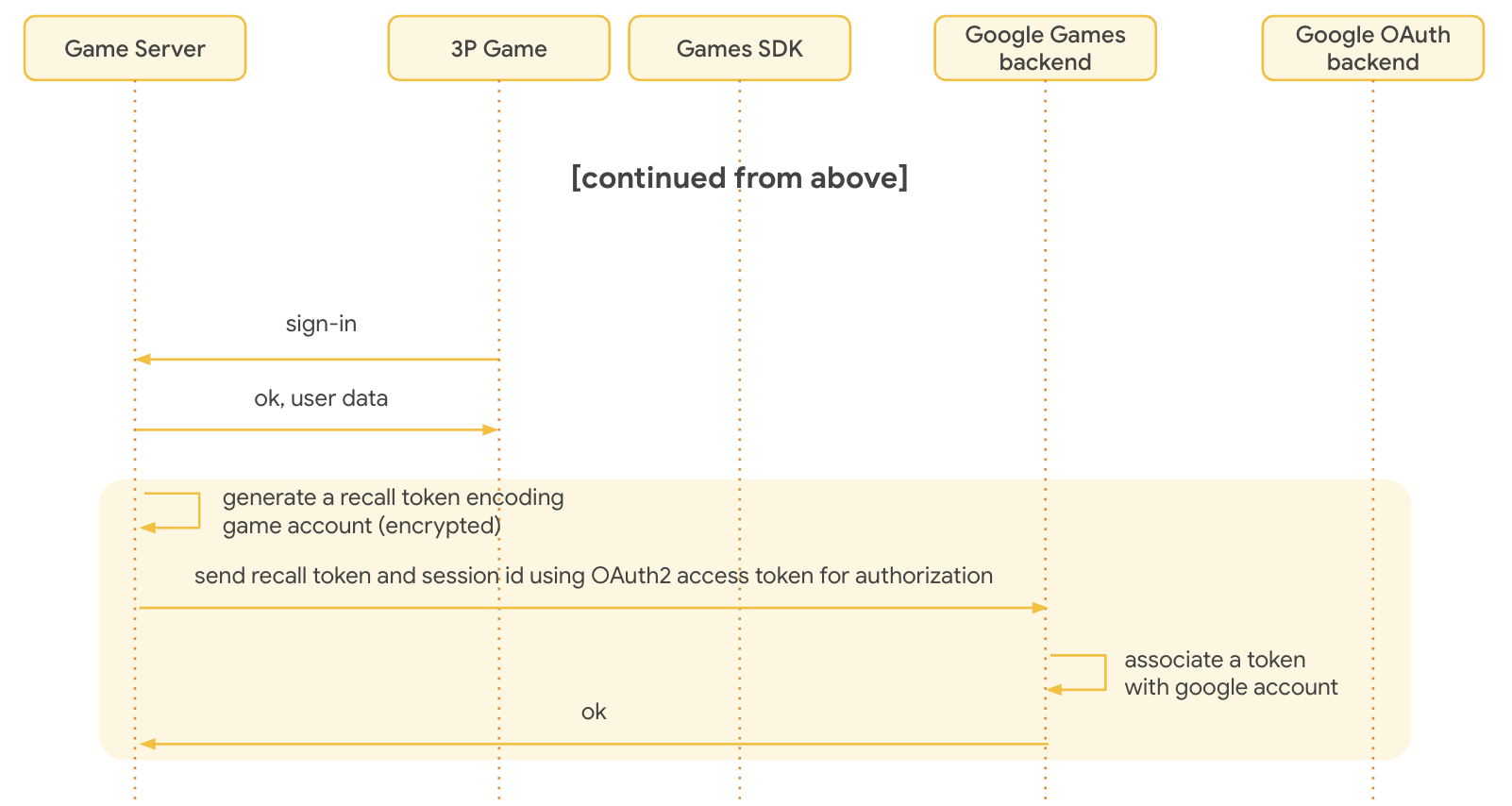
ขั้นตอนสำหรับผู้ใช้ที่ไม่มีโปรไฟล์ PGS
คุณจัดเก็บโทเค็นการเรียกคืนสำหรับผู้ใช้ที่ยังไม่ได้สร้างโปรไฟล์ PGS ได้โดย ใช้โหมดไม่มีโปรไฟล์ อย่างไรก็ตาม มีข้อควรระวังที่สำคัญ 2 ประการดังนี้
- คุณไม่สามารถเรียกโทเค็นสําหรับผู้ใช้ที่ไม่มีโปรไฟล์ PGS ระบบจะแจ้งให้สร้างโปรไฟล์โดยอัตโนมัติเมื่อผู้ใช้พยายามเข้าสู่ระบบเกมของคุณด้วยบริการเกมของ Play ในอุปกรณ์เครื่องที่ 2
- คุณต้องปฏิบัติตามหลักเกณฑ์เพิ่มเติม
เพื่อให้แน่ใจว่าคุณมีประกาศที่เหมาะสมซึ่งอธิบายรายการต่อไปนี้และ
ได้รับความยินยอมจากผู้ใช้ปลายทางที่เหมาะสม
- การแชร์ข้อมูลกับ Google เพื่อเปิดใช้ฟีเจอร์การลิงก์บัญชี Play Games
- ความพร้อมใช้งานของการตั้งค่าเพื่อจัดการการแชร์นี้ เช่น การตั้งค่า Play Games
- การประมวลผลข้อมูลดังกล่าวภายใต้นโยบายความเป็นส่วนตัวของ Google
จัดเก็บคู่โทเค็นและลักษณะตัวตน
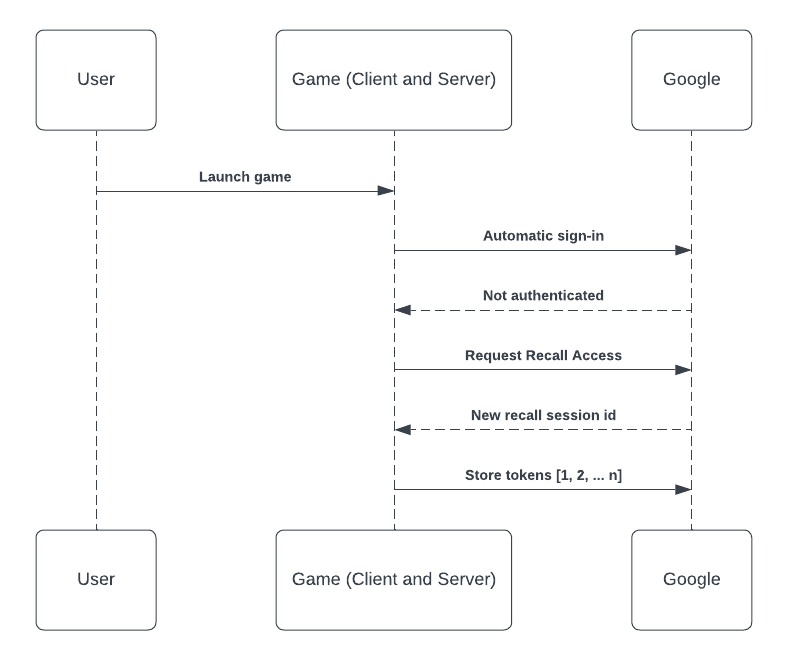
- ผู้ใช้ที่ไม่มีโปรไฟล์ PGS เปิดเกมที่เปิดใช้การเรียกคืนแบบไม่มีโปรไฟล์
- Games SDK จะทริกเกอร์การตรวจสอบสิทธิ์แพลตฟอร์มโดยอัตโนมัติ ซึ่งจะล้มเหลวเนื่องจากผู้ใช้ไม่มีโปรไฟล์ PGS
- SDK เกมจะแสดงแถบแสดงข้อความที่แจ้งให้ผู้ใช้ทราบว่าเกมมีการ ผสานรวมกับ Google แถบแสดงข้อความนี้ดำเนินการได้ โดยผู้ใช้สามารถปิดใช้ ฟีเจอร์เรียกคืนจนกว่าจะมีการสร้างโปรไฟล์
- เกมขอสิทธิ์เข้าถึงฟีเจอร์ความทรงจำ โปรดทราบว่า PGS จะปฏิเสธคำขอเข้าถึงการเรียกคืน เมื่อมีโปรไฟล์ PGS ในอุปกรณ์หรือเมื่อไม่มีบัญชี Google ในอุปกรณ์ ในกรณีดังกล่าว เกมควรดำเนินการต่อโดยไม่ต้องใช้ PGS
- หลังจากที่ผู้ใช้เข้าสู่ระบบด้วยบัญชีในเกมแล้ว เกมจะสร้างโทเค็นและ คู่เพอร์โซนาสำหรับผู้ใช้ซึ่งสอดคล้องกับบัญชีในเกมของผู้ใช้ เกม จะจัดเก็บคู่นี้ไว้กับ Google เกมอาจจัดเก็บโทเค็นเพิ่มเติมในภายหลังหาก ผู้ใช้เข้าสู่ระบบบัญชีในเกมอื่นๆ
เปิดเกมในอุปกรณ์เครื่องใหม่
- ผู้ใช้ที่ไม่มีโปรไฟล์ PGS เปิดเกมที่เปิดใช้การเรียกคืนแบบไม่มีโปรไฟล์ ในอุปกรณ์
- เกมจะบันทึกโทเค็น Recall ที่ไม่มีโปรไฟล์ตามที่อธิบายไว้ในจัดเก็บโทเค็น และคู่ลักษณะตัวตน
- ผู้ใช้เปิดเกมเดียวกันในอุปกรณ์อื่นที่มีการตั้งค่าบัญชีเดียวกัน
- SDK ของเกมจะทริกเกอร์การสร้างโปรไฟล์ ผู้ใช้สามารถตรวจสอบและปฏิเสธ โทเค็น Recall ที่จัดเก็บไว้ก่อนหน้านี้ได้ ผู้ใช้สร้างโปรไฟล์ PGS ในเวลานี้
- การตรวจสอบสิทธิ์แพลตฟอร์มโดยอัตโนมัติใน PGS เสร็จสมบูรณ์ และเกมจะได้รับสถานะ "ตรวจสอบสิทธิ์แล้ว"
- เกมจะเรียกโทเค็น Recall สำหรับผู้ใช้ตามปกติ
ขั้นตอนถัดไป
หากต้องการผสานรวม Recall API กับไคลเอ็นต์และเซิร์ฟเวอร์เกม ให้ทำตาม คำแนะนำนี้
